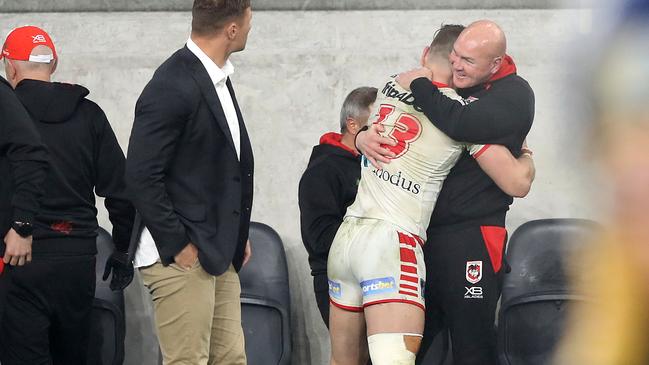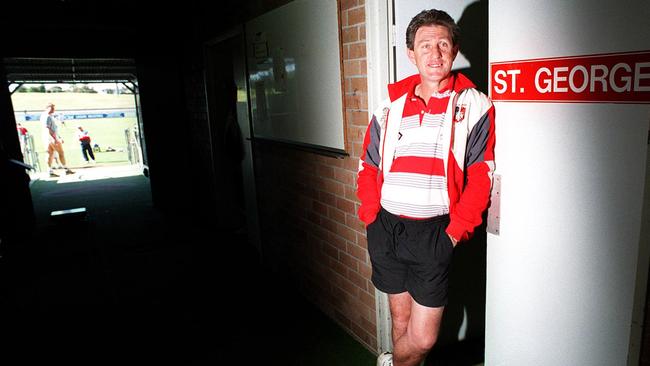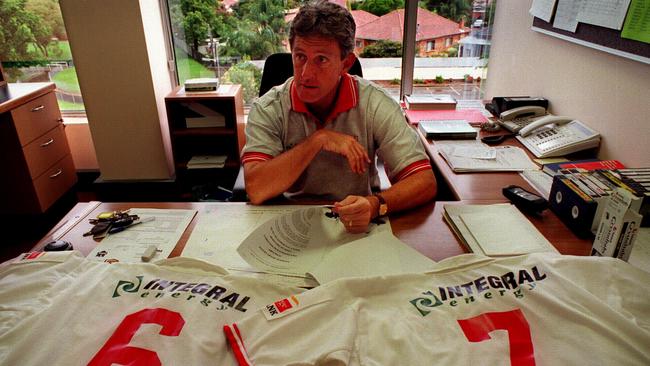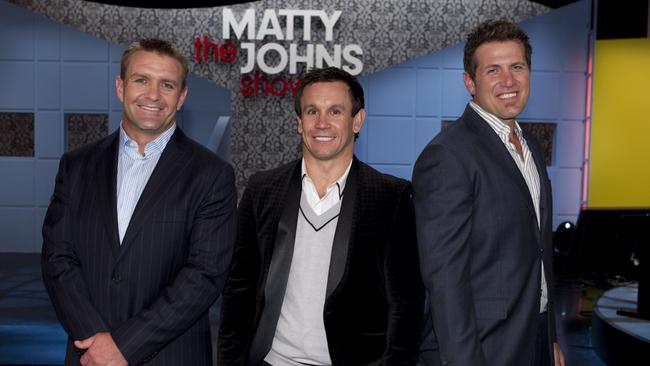Matty Johns: Why sacked coaches do a better job on the second go
Paul McGregor and his Dragons put together the win of their season last weekend – and it came after the coach had been shown the door. It’s a catch-22 that plenty of coaches will continue to go through for one reason, writes MATTY JOHNS.
NRL
Don't miss out on the headlines from NRL. Followed categories will be added to My News.
It’s a cruel irony that it’s not until a coach is sacked that he often gets the clarity to realise where things went wrong.
This week as Paul McGregor relaxed on the South Coast, enjoying a well-deserved beer, I have no doubt there would’ve been two emotions.
Primarily relief. At last his head is out of the fire, stress levels rapidly subsiding.
But there’ll be a tinge of regret, in that last week when his fears were realised and he was given his final match, coach Paul McGregor became ‘Mary’ again, he was a different man and they were a different team … arguably their best win of the season.
Kayo is your ticket to the 2020 NRL Telstra Premiership. Every game of every round Live & On-Demand with no-ad breaks during play. New to Kayo? Get your 14-day free trial & start streaming instantly >

The embrace Cam McInnes gave Mary at full-time showed the love the players have for their departing coach.
It’s just very hard to find the kind of clarity needed when you’re fighting for your career and your head’s ready to explode.
That’s why very often coaches do their best work the second time around.
Men like Tim Sheens, Johnny Lang and Anthony Griffin are just a few examples of that.
Another was former Knights coach David Waite.
Waite was a brilliant educator and he was an innovator.
After a successful first year in charge, where he took the team to the finals series in 1992, things got difficult in the following two seasons.
The feeling in the city was that the club was on the cusp of a first premiership.
But the team started slowly in season ’93, then there were injuries and some of the experienced players suffered a drop in form and a number of rookies, including myself, were brought in.
Suddenly it’s a young team and young teams are typically inconsistent. We copped some heavy defeats and the pressure started intensifying.

With the turnover of players, we became a club rebuilding. Hard to explain that to a town who believed a title was a real possibility.
Right throughout 1993 and ’94 the pressure rarely subsided and I saw the toll it took on Coach Waite.
He took some heavy beatings in the media, some of it fairly personal and of course that can’t help but affect your coaching.
With just a couple of rounds left in the season, David was given the tip he wouldn’t be coaching the club the following year.
I can only imagine how shattering that was for a man who was instrumental in building the club from the ground up.
In those last two weeks Waite showed us what a brilliant coach he was; he took risks, he encouraged, he motivated.
And then in 1996 he was given his ‘second time around’, after taking the reins of St George, with little preparation after Rod Reddy left the Dragons for Super League.
Waite took St George all the way to the grand final, with a fast, exciting style of football which launched Anthony Mundine as a superstar in the sport.
Everybody feels pressure, it’s finding the tools to deal with it that dictates how heavily it impacts.

I’ve never coached an NRL side, so I don’t claim to know how that furnace feels.
But I’ve experienced plenty of pressure in both my life in rugby league and my job in the media.
In fact it was in 2010 when returning to TV with a prime time show on Channel 7, where I had little experience or the skills to be any type of host, was the most pressure I’d felt in my working life.
As we got closer to show number one, the more my anxiety grew.
The nature of television, particularly free-to-air, means there’s a lot of pressure for ratings from the outset.
If the show doesn’t rate, as we see quite often these days, it can be axed in just a few weeks.
We did a couple of rehearsal shows in which I had no idea what I was doing, and I could see the concern on the face of the producers.
A few days out from the opening show I was rattled and filled with a sense of impending doom.
But right at the point of peak anxiety, out of nowhere came a small moment of clarity.
I asked myself, “What’s the worst thing that can possibly happen? The show stinks and it gets axed.”
Could I live with that?
Absolutely I could.

From that moment I relaxed and actually enjoyed it.
And you wouldn’t believe what happened next.
The show stunk and it got axed … but I can live with that.
It’s intriguing to see how coaches handle pressure differently.
I got to see it up close when at Channel 9, given the unenviable job of interviewing coaches in the sheds at full-time.
Asking the losing coach for an interview is like asking someone to kick you in the balls.
I got to know why some coaches had such brief careers.
In victory they strutted like peacocks and celebrated like they’d won lotto.
In defeat they were hunched over, distraught, like they’d got all the right numbers in lotto but forgot to put it on.
MORE FROM MATTY JOHNS
Matty Johns: From Turvey and Tommy to Spud and Chief, rugby league has had some great feuds
Matty Johns: A lack of leadership hurting the Brisbane Broncos now and into the future
NRL 2020: Craig Bellamy sledges Andrew, Matty Johns over Cooper Johns selection
Matty Johns: Dean Pay was always on a hiding to nothing at the Canterbury Bulldogs
Then there were the old coaches, the men who had succeeded and survived. Men who had the tools do deal with pressure.
Men like Wayne Bennett, Tim Sheens, Johnny Lang.
Win or lose, when I asked Wayne for a comment he’d give a smile and walk away.
Win or lose, Tim Sheens always shared his thoughts generously and unemotionally.
And Johnny Lang … well if you judged a coach’s face as to whether his side won or lost at fulltime, you’d always think Johnny had lost.
Even when his Panthers won the 2003 grand final, Johnny, as he walked onto the field in victory said words to the effect of, “I’m waiting for the alarm to go off….”
Win or lose, same bloke.
